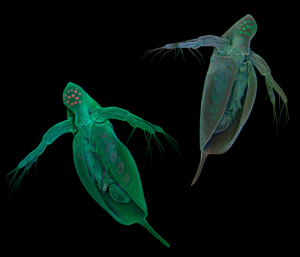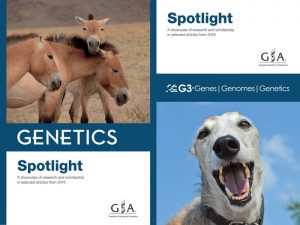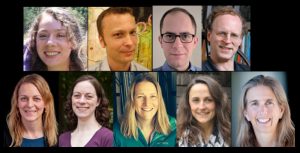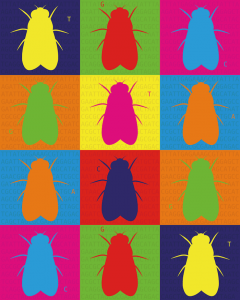Enter your address to receive notifications about new posts to your email.
Articles tagged Genetics Journal
(334 results)
-
On the cover: Daphnia in the spotlight
Illuminating the cover of the May issue of G3 is a lake-dwelling filter feeder no more than a couple millimeters long. This microcrustacean—Daphnia pulex, also known as the water flea—is an important model organism, especially in ecological genetics. But despite Daphnia’s status as a model organism, no one had examined its population genomics until now.…
-
Microbial DNA repair goes nuclear
In the ruins of the Chernobyl Nuclear Power Plant—an area deemed unsafe for humans for the next 20,000 years after a catastrophic failure—life thrives. Fungi that reside there, along with other organisms that can survive large radiation doses, must have strategies to cope with the DNA-damaging effects of living at a meltdown site. In the…
-
May GENETICS Highlights
Check out the May issue of GENETICS by looking at the highlights or the full table of contents! ISSUE HIGHLIGHTS Bivariate analysis of age-related macular degeneration progression using genetic risk scores, pp. 119-133 Ying Ding, Yi Liu, Qi Yan, Lars G. Fritsche, Richard J. Cook, Traci Clemons, Rinki Ratnapriya, Michael L. Klein, Gonçalo R. Abecasis, Anand Swaroop, Emily…
-
The push-and-pull evolution of tandem-duplicated drug-resistance genes
Two highly similar genes that contribute to drug resistance in a pathogenic yeast have been co-evolving as tandem duplicates for the past 134 million years—while maintaining distinct functions. This is the conclusion of a paper in the April issue of GENETICS by Lamping et al. that examines the evolutionary effects of ectopic gene conversion. Evolutionary…
-
GSA Journals Spotlight 2016
The GSA Journals, GENETICS and G3: Genes|Genomes|Genetics, are proud to present our annual Spotlight booklets for research published in 2016. Each Spotlight is a showcase of the excellent research and scholarship published over the course of the year, along with a selection of striking images submitted by our authors. Browse the 2016 GENETICS Spotlight. Browse the 2016 G3 Spotlight. GENETICS SPOTLIGHT CITATIONS 2016 EDITORS’…
-
Three outstanding GENETICS articles honored with Editors’ Choice Awards
Congratulations to the winners of the Editors’ Choice Awards for outstanding articles published in GENETICS in 2016! The journal’s Editorial Board considered a diverse range of articles, finding many papers worthy of recognition. After much deliberation, they settled on one exceptional article for each of the three award categories: quantitative genetics, molecular genetics, and population and evolutionary…
-
Behind the cover: CRISPR in color
In the life of a butterfly, color is crucial. Color helps these flashy insects attract mates, avoid being spotted, or even signal to predators that they would make a bad meal. On the cover of the March issue of GENETICS is a close-up view of Junonia coenia, a butterfly with stunning blue eyespots on its…
-
Live long and prosper (under the right conditions)
Restricting calorie intake seems to promote longer lives in a wide range of organisms, from microbes to mammals. Some determined youth-seekers are already adopting reduced-calorie diets in an attempt to extend their lifespans. But it’s not clear yet that these anti-aging effects apply to humans, and the mechanisms by which they work in other organisms…
-
April GENETICS Highlights
Check out the April issue of GENETICS by looking at the highlights or the full table of contents! ISSUE HIGHLIGHTS Mismatch repair incompatibilities in diverse yeast populations, pp. 1459-1471 Duyen T. Bui, Anne Friedrich, Najla Al-Sweel, Gianni Liti, Joseph Schacherer, Charles F Aquadro, and Eric Alani Microbial populations with elevated mutation rates can adapt more rapidly to new…
-
50 years of molecular evolution in Drosophila
In the genomic era, population geneticists are flooded with molecular data on the evolution of natural populations. This deluge started in 1966 as a trickle of data from protein electrophoresis studies, including the landmark GENETICS papers published by Richard Lewontin and John Hubby. As Lewontin is honored this week at the Annual Drosophila Research Conference…
-
Snorkeling out of the membrane
One of the last places you’d expect to find a charged amino acid residue is buried within the hydrophobic interior of a lipid bilayer. And for the most part, this expectation holds true: portions of proteins that span membranes are typically composed of hydrophobic residues. But in some cases, the positively charged residues lysine and…











![By National Park Service [Public domain], via Wikimedia Commons.](https://s36063.pcdn.co/wp-content/uploads/2017/03/biscayne_np_snorkeling-1-300x214.jpg)